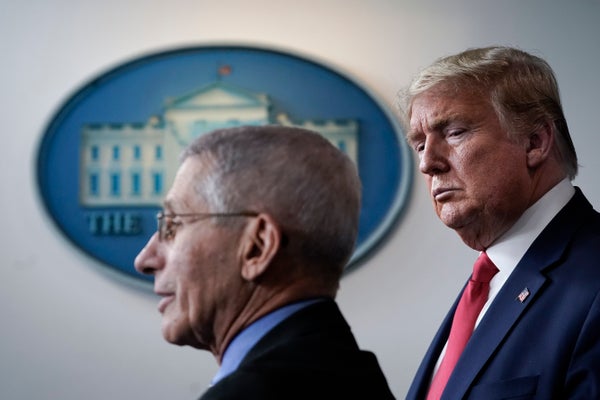
The Real Reason People Dont Trust in Science Has Nothing to Do with Scientists
www.scientificamerican.com
OpinionJanuary 6, 20255 min readThe Real Reason People Dont Trust in Science Has Nothing to Do with ScientistsPropaganda works, is the real upshot of a survey showing lingering post-pandemic distrust of scienceBy Dan Vergano edited by Jeanna BrynerDr. Anthony Fauci, director of the National Institute of Allergy and Infectious Diseases, speaks as U.S. President Donald Trump looks on in 2020. Drew Angerer/Getty ImagesWere all trying to find the guy who did this, said the hot-dogcostumed protagonist of a 2019 comedyIn the sketch turned popular meme, bystanders didnt buy his story. Scientists, and the rest of us,Pew Research Center survey of public confidence in science.The Pew survey found 76 percent of respondents voicing a great deal or fair amount of confidence in scientists to act in the publics best interests. Thats up a bit from last year, but still down from prepandemic measures, to suggest that an additional one in 10 Americans has lost confidence in scientists since 2019.On supporting science journalismIf you're enjoying this article, consider supporting our award-winning journalism by subscribing. By purchasing a subscription you are helping to ensure the future of impactful stories about the discoveries and ideas shaping our world today.Why? Pews statement and many news stories about the findings somehow missed the obvious culprit: the four years and counting of a propaganda campaignDonald Trumps alliesblame to scientistsfirst administrations disastrous,botched handling of the COVID pandemic1.2 million Americans. Even the hot dog guy would blanch atthe transparencythe scapegoating. It was obviously undertaken to inoculate Trumpkicked off four years agoUSA TODAY screedsent to federal prisonSimilar inanitiesleading to yearsright-wing nonsensesurreal hearingsFauci. BrowbeatingCOVID vaccinesmillions of livesa combative hearingas mendacious as it was shameful. The Pew surveys results, however, show this propaganda worked on some Republican voters. The drop in public confidence in science the survey reports is almost entirely contained to that circle, plunging from 85 percent approvalmasking, schoolbusiness restrictions, and vaccines, werent necessitiesexcess death rates were 1.5 timesAmanda Montaez; Source: Pew Research CenterInstead of noting the role of this propaganda in their numbers, Pews statement about the survey pointed only to perceptions that scientists arent good communicators, held by 52 percent of respondents, and the 47 percent who said, research scientists feel superior to others in the survey.That explanation echoes the kick me sign that scientific institutions have taped to their backsides over distrust at least since 1985, when the U.K.s Royal Society warned of [h]ostility, even indifference, to science and technology, in a report, The Public Understanding of Science. Scientists must learn to communicate better with all segments of the public, it concluded.That prescription matches scientific responses to the Pew Survey results, with National Academies of Sciences chief Marcia McNutt telling the Washington Post: [T]his gives us an opportunity to reexamine what we need to do to restore trust in science. And it matches the advice in a December NASEM report on scientific misinformation: Scientists, medical professionals, and health professionals who choose to take on high profile roles as public communicators of science should understand how their communications may be misinterpreted in the absence of context or in the wrong context. This completely ignores the deliberate misinterpretation of science to advance political aims, the chief kind of science misinformation dominating the modern public sphere.It isnt a secret what is going on: Oil industryfunded lawmakers and other mouthpieces have similarly vilified climate scientists for decades to stave off paying the price for global warming. A study published in 2016 in the American Sociological Review concluded that the U.S. publics slow erosion of trust in science from 1974 to 2010 was almost entirely among conservatives. Such conservatives had adopted limited government politics, which clashes with sciences fifth branch advisory role in setting regulationsseen most clearly in the FDA resisting Trumps calls for wholesale approval of dangerous drugs to treat COVID. That flavor of politics made distrust for scientists the collateral damage of the half-century-long attack on regulation. The utter inadequacy of an unscientific, limited-government response to the 2020 pandemic only primed this resentmentfanned by hate aimed at Faucito deliver the dent in trust for science we see today.Surveys are well-suited for measuring attitudes and describing changes in views over time. They are less well-suited for parsing potential causal factors, says survey lead author Alec Tyson, when asked why Pew refrained from making this obvious connection. While beyond the scope of this particular effort, we share an interest in scholarly efforts to understand the role of partisan rhetoric and the broader information environment in shaping views.Their aversion doesnt mean we all must play make-believe about where the distrust for science springsfrom politics. Perhaps the clearest sign of the propaganda campaign is that Republican politicians have gotten high on their own supply of antiscience hokum. With Trump headed back to the White House, his profoundly unqualified pick for Department of Health and Human Services chief isRobert F. Kennedy, Jr.,contributed to 83 measles deathsJay Bhattacharya, one of three authorspushed then on the Trump White Houseto spur coronavirusinfectionspreventable deaths of hundreds of thousands of people, according to the Infectious Diseases Society of America. Neither of these hot-dog-guy picks should be allowed anywhere near our vital health agencies.Its obviously this guy, right, say the cops at the end of the hot-dog-guy sketch, before setting off in his pursuit. Making that same call on recognizing where the distrust for science comes from today is just as simple.This is an opinion and analysis article, and the views expressed by the author or authors are not necessarily those of Scientific American.
0 التعليقات
·0 المشاركات
·105 مشاهدة


